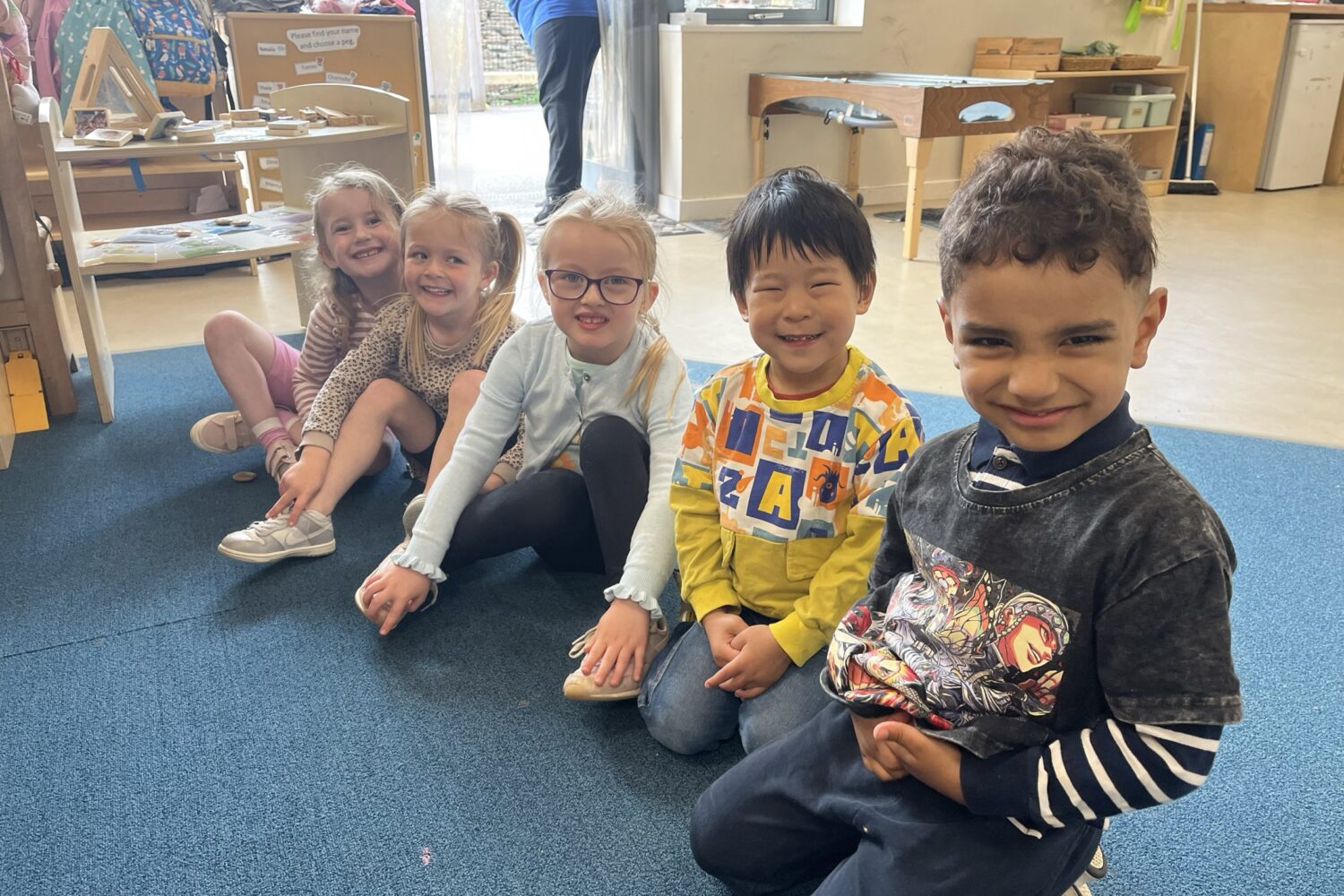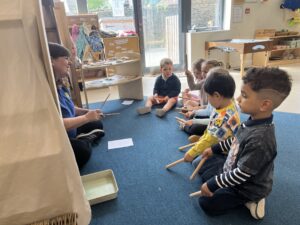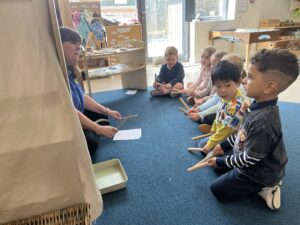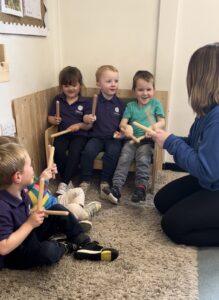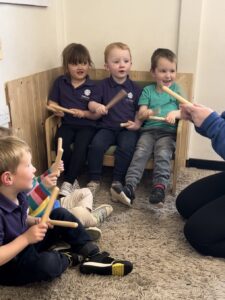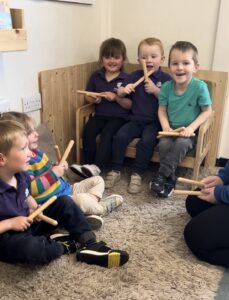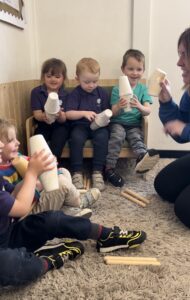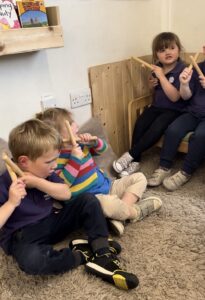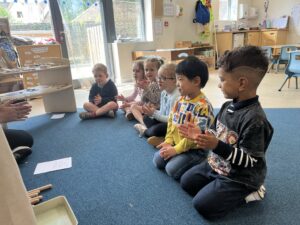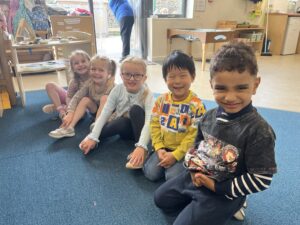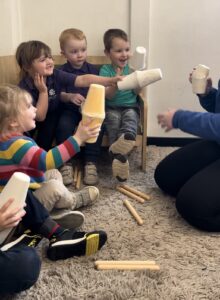After launching the Boogie Mites programme across our Happy Days Nurseries in December, it’s became increasingly popular among the children and the staff. It support goals underpinned by the ‘Strong and Confident Communicators’ aspect of our unique ‘Where Children Shine’ curriculum.
We want to explain what makes Boogie Mites so special and why it is so popular among our nurseries. Read on to discover all the benefits of this fantastic programme.
Did you know we have produced a short podcast series on Boogie Mites and how you can utilise it at home? The four-part series contains detailed episodes between 7 and 10 minutes long, providing detailed information in an engaging, bite-sized way.
Check out the whole series on Spotify here!
What is Boogie Mites
Boogie Mites aims to offer early years educators and parents the knowledge, confidence, and resources to harness the brain-boosting power of music every day, encouraging children to move and develop through music.
Why is Boogie Mites such an important part of the curriculum?
Neuroscience shows that regular music-making develops strong neural connections across the whole brain. Like the foundation of a house, stronger neural connections lead to bigger, better brains and underpin learning. Below are areas supported by Boogie Mites.
Prime Areas:
Personal, social and emotional development
Self-confidence and self-awareness
Music helps children to try new activities. To become more confident to speak in a familiar group talking about their ideas.
Managing feelings and behaviour
Music helps children talk about how they and others show feelings, talk about their own and others’ behaviour, and its consequences, and know that some behaviour is unacceptable. To work as part of a group or class, understand and follow the rules.
Managing feelings and behaviour
Music helps children play co-operatively, taking turns with others.
Communication and language
Listen and Attention
Music encourages children to listen attentively in a range of situations. To listen to stories, anticipating key events and respond to what they hear with relevant comments, questions or actions. To give their attention to what others say and respond appropriately, while engaged in another activity.
Understanding
Music encourages children to follow instructions involving several ideas or actions.
Speaking
Music encourages children to express themselves effectively.
Physical development
Moving and handling
Music helps children show good control and co-ordination in large and small movements. To move confidently in a range of ways, safely negotiating space. To handle equipment and tools effectively – such as instruments.
Health and self-care
Music helps children know the importance of good health of physical exercise and a healthy diet, and talk about ways to keep healthy and safe.
Specific Areas:
Literacy
Reading
Music helps children gain phonic knowledge that will contribute to decoding regular words and read them aloud accurately. To recognise rhymes, rhythms and patterns of words. To use expression in storytelling through work with intonation, tempo, dynamics, actions and facial expressions that go with music-making.
Writing
Musical instruments help children develop fine motor skill and manipulation required for writing.
Mathematics
Numbers
Music helps children order and say which number is one more or one less than a given number. To use counting on and counting back, shapes and one to one correspondence. Music is built on recurring mathematical patterns and sequences – children can develop mathematical thinking as they respond to this.
Shape, space and measure
Music helps children use everyday language to talk about size, position and to learn special awareness. Music and movement helps children to recognise, create and describe patterns and to explore characteristics of everyday objects and shapes.
Understanding the world
People and communities
Music helps children talk about past and present events in their own lives and in the lives of family members. To learn about similarities and differences between themselves and others, and among families, communities and traditions – different cultures.
The World
Music provides a learning style through which topics can be explored. It can help children know about similarities and differences in relation to places, objects, materials and living things. To talk about their own immediate environment and how environments might vary from one another. To make observations of animals and plants.
Expressive arts and design
Exploring and using media and materials
Music helps children to sing songs, make music and dance, and experiment with ways of changing them.
Being imaginative
Music helps children represent their own ideas, thoughts and feelings through music, dance, role-play and stories.
How does it fit in with our ‘Where Children Shine Curriculum’?
Boogie Mites is part of the Strong and Confident Communicator aspect of our curriculum which focuses on supporting children to listen, understand and communicate. This aspect of our curriculum supports children’s ability to listen, understand and communicate, which is crucial for lifelong learning and future success. It is underpinned by Communication & Language, Personal Social & Emotional Development, Literacy and Expressive Art & Design.
Every Happy Days Nursery delivers the following programmes to support this aspect of the curriculum:
- Awe & Wonder Book Club
- Letters & Sounds
- Sing & Sign
- Babbling Babies & Toddler Talk
- Musical Matters
- Boogie Mites
In the Boogie Mites School Ready Programme each song has a direct link to Letters and Sounds Phase One. The 25 songs within the programme have been informed by neuroscience and specifically written to capture the imagination of young children. The different genres of upbeat music are used to offer diverse experiences with the fun lyrics and great melodies developing children’s rhythmic and melodic awareness.
This programme recognises the importance that daily music and singing plays in developing strong foundations for early language acquisition and literacy skills, this includes opportunities for sound recognition and phonological and phoneme awareness.
Each Nursery has a Boogie Mites Ambassador who has attended a Boogie Mites School Ready Workshop led by a Boogie Mites Trainer.
For more information on Boogie Mites and other aspects of our curriculum, please feel free to get in touch
We’re no strangers to effective childcare and parenting tips. We are a leading nursery chain operating in the Southwest of England and South of Wales, helping young children prepare for school with purpose-built facilities and a specialist curriculum of learning.
Get in touch if you have any questions by calling 0800 783 3431 or emailing enquiries@happydaysnurseries.com, or use our Find a Nursery tool to see which of our nurseries or preschools is closest to you!
